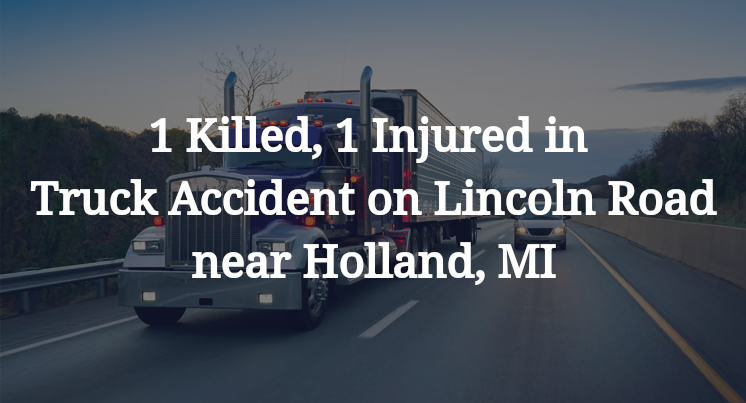1 Killed, 1 Injured in Truck Accident on Lincoln Road near Holland, MI
Allegan County, MI — July 14, 2025, one person was killed and another was injured in a truck accident at about 6:20 a.m. on Lincoln Road/State Highway 40.
Authorities said a northbound pickup collided with a southbound semi-truck near 141st Avenue south of Holland.

The pickup driver, a 53-year-old man whose name has not been made public yet, died at the scene of the crash in Fillmore Township, according to authorities.
The truck driver was hospitalized with non-life-threatening injuries after the crash, authorities said.
Authorities have not released any additional information about the Allegan County crash at this time. The accident is still being investigated.
Commentary
When people hear that a pickup and a semi-truck collided on a rural highway early in the morning, their first thought is usually: How does something like that happen? Was someone distracted? Did one of the vehicles cross into the wrong lane? And is there more to the story than what authorities are saying?
At this point, investigators haven't released much beyond the basic outline: a northbound pickup and a southbound 18-wheeler collided on State Highway 40 near 141st Avenue. One driver didn't survive, and the other, behind the wheel of the truck, was injured but survived. What’s not clear is how the two vehicles came into conflict on what’s likely a simple two-lane highway. Was one vehicle trying to pass? Did one drift across the center line? Were both in motion, or was one stopped or turning?
Without answers to those questions, we’re missing the key to understanding who’s responsible and why.
To get to the bottom of that, a real investigation needs to go beyond measuring skid marks and photographing wreckage. The most important evidence in truck crashes today isn’t found just at the crash site; it’s buried in data. That includes the truck’s engine control module (ECM), which records speed, brakin, and throttle use. It includes dash cam footage, GPS records and cell phone activity logs. And it includes in-cab camera footage, if the trucking company had any installed.
If the truck crossed the center line, then the focus should turn to the truck driver: Was he distracted, fatigued, or impaired? Was there a mechanical issue with the truck that should have been addressed beforehand? Did his employer give him realistic delivery expectations, or push him to drive unsafely? On the other hand, if the pickup crossed over, then the questions shift accordingly.
I’ve handled cases where those answers were anything but obvious. In one, the ECM showed a truck slowing before impact, but the in-cab footage revealed the driver was looking down at his phone. In another, a trucking company hired a driver with a record of failed drug tests, then claimed they didn’t know. In both cases, the real problem wasn’t just individual driver error; it was systemic negligence hiding behind a wall of silence.
That’s why it’s not enough to rely on initial reports. Those reports usually say what happened, not why. Real answers only come when someone insists on collecting all the relevant evidence and holding the right people accountable for their decisions.
Key Takeaways:
- It’s unclear from current reports which vehicle crossed the center line or why the collision occurred.
- Critical evidence like ECM data, dash cam footage and cell phone records can shed light on what the truck driver was doing at the time.
- Depending on who crossed over and why, responsibility could fall on the truck driver, the pickup driver or others behind the scenes.
- Trucking company hiring and monitoring practices may be relevant if the trucker was unfit to drive or improperly supervised.
- Determining accountability requires more than speculation; it requires a full and independent investigation.

“These are essential reads for anyone dealing with the aftermath of a truck wreck”– Attorney Cory Carlson